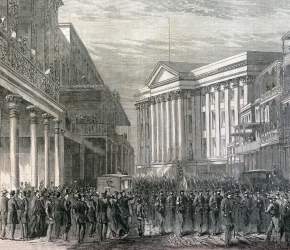Record Data
"Louisiana," The American Cyclopedia and Register of Important Events of the Year 1866 (New York: D. Appleton and Company, 1873), 452.
John Kendall, History of New Orleans, Volume I (New York: Lewis Publishing, 1922), chapter XIX.
Transcription
The following text is presented here in complete form, as it originally appeared in print. Spelling and typographical errors have been preserved as in the original.
GENTLEMEN OF THE GRAND JURY:
You ask for more specific instructions relative to your powers to suppress unlawful assemblies, dangerous to the peace and good order of the State, such as is advised to take place on the 30th instant. Every thing is comprehended in the instructions already given.
The Constitution of 1864 is the fundamental law of the State, and furnishes ample protection for its supremacy, and can only be altered or amended in accordance with the provisions contained in the instrument itself. The oath required to support a constitution by officers of a State who are intrusted with its admission is one of the guaranties that it will not be betrayed. In some governments, a violation of that oath would not only be perjury, but treason, which being a higher grade of felony, perjury is merged in it.
Under the Constitution of this State, a violation of oath of office would be perjury and nothing more. I, and every officer in the State of Louisiana, have sworn to support the constitution, and substantially make oath that it shall not be altered in any other manner than is provided in the 17th article of that instrument.
I now charge you that a violation of that oath is perjury in the officer or officers who violate it, and subornation of perjury in all who procure it to he
done.
The 147th article of the constitution of 1864, made by the late convention, clearly points out the mode of amending it. It reads: "Any amendment or amendments to this constitution may be proposed in the Senate or House of Representatives, and if the same shall be agreed to by a majority of the members elected to each house, such proposed amendment or amendments shall be entered on their journals, with the yeas and nays taken thereon. Such proposed amendment or amendments shall be submitted to the people at an election to be ordered by the said Legislature, and held within ninety days after adjournment of the same, and after thirty days publication according to law; and if a majority of the voters at said election shall approve and ratify such amendment or amendments the same shall become a part of this constitution. If more than one amendment is submitted at a time they shall be submitted in such manner and form that the people may vote for or against each amendment separately."
This, gentlemen, is the only mode pointed out by the constitution, and it being fully ratified by the people, it can only be altered by their own consent expressed at the ballot-box or by the Legislature.
By the second clause of article 149 it is declared that "all laws in force at the time of the adoption of this constitution, and not inconsistent therewith, shall continue as if the same had not been adopted."
These laws furnish ample vindication for the integrity of the constitution. Among the laws thus adopted, by the convention itself, are several sections against breaches of the peace, misdemeanor in office, unlawful assemblies, vagrancy, perjury, and subornation of perjury. And it is my duty as one of the conservators of the peace and Judge of the Criminal Court, and you as a grand inquest of the parish of Orleans, and of all other peace officers, to use all lawful means to prevent any unlawful assembly or assemblies, and such as would have a natural tendency to create a breach of the public peace.
Any attempt to alter the constitution of the State in defiance of its provisions, by an body of men, unauthorized by the provisions of the constitution, or emanating directly from the people through the ballot-box, is illegal and unconstitutional, and punishable by law.



